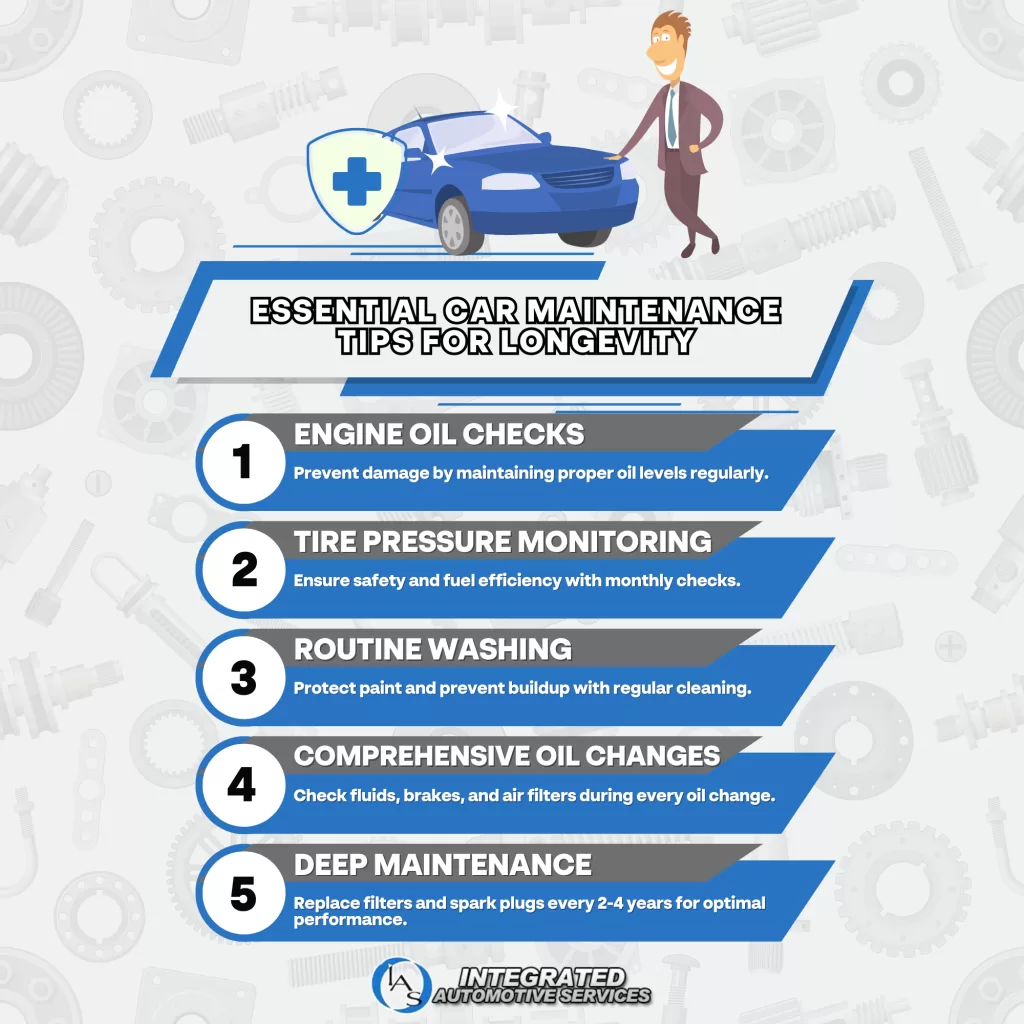Proper care for your new car involves regular maintenance. Always check your engine oil; insufficient levels may cause severe damage. Keep tire pressure at the recommended level for ideal safety and fuel efficiency. Frequent washing keeps your car’s paintwork free from dirt and contaminants, while thorough vehicle check-ups during oil changes promote overall functionality. Deeper maintenance every two to four years extends your car’s lifespan and performance. Incorporating these practices into your routine assures you of better returns on your new car investment. As you move forward, you’ll discover even more ways to maintain your car’s health.

Key Takeaways
- Regularly check and maintain the engine oil level to prevent engine damage and costly repairs.
- Monitor tire air pressure for enhanced fuel efficiency and safety, using the recommended pressure found on the driver’s side door jamb.
- Establish a routine for washing the car to protect the paintwork from dirt and contaminants, using automotive-specific cleaning products.
- Every time the oil is changed, perform other vehicle checks such as fluids, brake pads, tire condition, and air filter status.
- Schedule regular deep maintenance every two to four years, including replacing filters, changing coolant, and replacing spark plugs for long-term vehicle health.
Check the Engine Oil
Don’t let your new car’s engine run dry! Regularly checking your engine oil is an essential part of your car maintenance checklist. It’s not just about keeping your car running; it’s about ensuring its longevity and ideal performance.
When it comes to auto maintenance, many overlook the importance of checking the engine oil. Yet, it’s as important as fuel. Your engine oil lubricates moving parts, reducing friction and preventing damage. Without sufficient oil, you’re risking severe engine damage, which can lead to costly repairs down the line.
To check your oil, you’ll need to locate the dipstick under your hood. Pull it out, wipe it clean, then reinsert it fully. When you pull it out again, you’ll see where your oil level sits. If it’s between the minimum and maximum marks, you’re good to go. If it’s below the minimum, you’ll need to top up your oil.
Check Tire Air Pressure
Just as maintaining appropriate oil levels is important for your engine’s health, keeping a watchful eye on your tire air pressure can greatly impact your car’s performance and safety.
This essential part of new car care might seem simple, but it plays a considerable role in fuel efficiency, tire longevity, and overall safety.
As a part of your car maintenance tips, make sure you check your tire pressure at least once a month. Most vehicles have a placard on the driver’s side door jamb or in the owner’s manual that lists the recommended tire pressure.
Remember, it’s not advisable to inflate your tires to the maximum pressure listed on the tire sidewall.
Another important automotive maintenance tip is to check the tire pressure when the tires are cold, as driving heats up the tires and increases the pressure. An accurate reading is crucial for peak performance.
Invest in a good quality tire pressure gauge and keep it in your vehicle. In case of a noticeable drop in pressure, it’s advisable to have your tires checked by a professional.
Regular monitoring and maintenance of tire air pressure contribute considerably to your new car’s health and your safety.
Wash the Car
To keep your new car in pristine condition, regular washing is essential. It’s not just about aesthetic appeal; it’s an important part of your car maintenance schedule. Washing your car removes dirt and contaminants that can damage the paintwork over time.
Invest in new car care products specifically designed for automotive use. These products are gentle on your car’s surfaces and effective in removing dirt and grime. Don’t use dish soap or other household cleaners, as they can strip the protective wax coating on your vehicle.
Get into a routine of washing your car at least every two weeks. If you’re driving in harsh conditions or notice a build-up of dirt, wash it more frequently.
Start from the top and work your way down, ensuring every area is thoroughly cleaned.
Other Checks at Each Oil Change
During each oil change, there are several other important checks you should perform to guarantee your new car maintains peak performance. It’s not just about changing the oil; vehicle maintenance involves a thorough approach to make certain your car servicing is complete.
First, check your vehicle’s fluids, such as brake fluid, transmission fluid, and coolant. These are crucial for your car’s functionality. Neglecting them can lead to poor performance and damage over time.
Next, examine your car’s brake pads and rotors. This will help assure your safety on the road.
You should also inspect your car’s tires. Check for any signs of wear and tear, confirm they’re properly inflated, and have them rotated if necessary. Good tires contribute to better fuel efficiency and handling.
Lastly, don’t forget about the air filter. A dirty air filter can reduce your car’s gas mileage, lower its performance, and sometimes lead to engine damage.
Incorporating these checks into your new car care package will make certain your vehicle stays in excellent condition.
Regular Maintenance For Every Two to Four Years
Every two to four years, it’s crucial that you engage in more thorough maintenance for your new vehicle. This type of care is more in-depth than your regular oil change and involves certain checks and replacements to keep your car running smoothly.
One important aspect of how to take care of a new car involves replacing the cabin and engine air filters. Over time, these filters can get clogged, reducing the efficiency of your vehicle and affecting the quality of the air inside your car.
Another key car tip is to flush and replace the coolant. This prevents your engine from overheating and can greatly extend the life of your vehicle.
You should also consider replacing the spark plugs and wires. These are essential for the proper functioning of your engine. Old or faulty spark plugs can lead to poor fuel economy and decreased performance.
Frequently Asked Questions
What Type of Fuel Is Best for My New Car?
You’ll need to check your car’s manual to see what fuel type it requires. If it’s a high-performance car, it’ll likely need premium. Otherwise, regular unleaded should work fine. Always follow manufacturer’s recommendations.
How Often Should I Replace the Brake Pads in My New Car?
You might think brake pad replacement isn’t urgent, but it’s essential for safety. Generally, replace them every 50,000 miles, but consult your vehicle’s manual or a trusted mechanic for the most accurate advice.
When Should I Have My New Cars Timing Belt Inspected or Replaced?
You should get your new car’s timing belt inspected every 60,000 to 100,000 miles. However, it’s best to consult your vehicle’s manual for specifics, as each model’s maintenance schedule can vary.
How Can I Maintain the Battery Life of My New Vehicle?
To maintain your new vehicle’s battery life, guarantee it’s always fully charged. Avoid short trips that can’t recharge it. Regular servicing is key, just like keeping a plant watered and in sunlight.
What Are the Signs My New Car Needs a Wheel Alignment Check?
If you’re noticing uneven tire wear, your car’s pulling to one side, or your steering wheel’s off-center while driving straight, it’s likely time for a wheel alignment check. Don’t hesitate, get it inspected soon.
Conclusion
You’re now in the driver’s seat of caring for your new car. With regular check-ups and a keen eye on maintenance, it’ll run like a dream for years to come. Remember, your car is like a trusted steed; treat it well, and it’ll never let you down. So, keep your engine purring, your tires pumped, and your car sparkling. After all, a well-cared-for car is not just a joy to drive, it’s a badge of honor.



